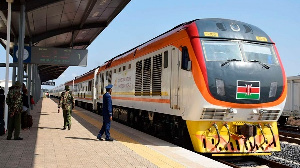Funeral row causes chaos for mourners of Zambia’s ex-president

Add the clashing desires of a national government and its political opponents into the mix, and things become doubly complicated.
Edgar Lungu, who led Zambia from 2015 to 2021, died last Thursday. His death at the age of 68 has shocked Zambians – and there is genuine sense of grief with all radio stations playing gospel music for the man who had remained influential in Zambian politics despite being barred from contesting next year’s election.
Zambia is officially a Christian country – and most people take their religion and periods of mourning seriously.
But a standoff between his family, the government and Lungu’s political party, the Patriotic Front (PF), has left mourners confused about how exactly the former president should be honoured.
The government announced there would be a state funeral and declared that the official venue for mourning would be a lodge it owns in the capital, Lusaka, but the PF dismissed this plan, directing mourners to its headquarters instead.
As for Lungu’s family, they have said they are not opposed to a state funeral, but have insisted on choosing who will preside over it, family lawyer Makebi Zulu has told the BBC.
Then there is the official book of condolence, in which mourners can pay tributes to Lungu. The government has set up an official book – at the lodge – but the PF has urged people to sign theirs instead – at their headquarters.
The government wanted to repatriate his body from South Africa last week – Lungu died there after receiving treatment for an undisclosed illness.
However, the PF and Lungu’s family intervened, wanting to organise the safe passage of the ex-leader themselves.
“The state was saying, ‘We are giving him full military honours, therefore we’re taking over from here’ – as if to say that ‘you have no say over what happens,'” Mr Zulu said.
Plans for returning Lungu’s remains are still unclear, though the family are now engaging with the government on this issue.
There has also been confusion over the “official” mourning period when all forms of entertainment like big football matches and concerts are stopped.
The government declared a seven-day national mourning period starting last Saturday, even though the PF announced one days earlier.
This chaos is, in short, a continuation of the tumultuous relationship between Lungu and his successor, President Hakainde Hichilema.
The pair are long-time rivals – in 2017, when Lungu was president, he had Hichilema locked up for over 100 days on treason charges after Hichilema’s motorcade allegedly refused to give way for him.
It took the intervention of the Commonwealth for Hichilema to be released. Four years later, and after five attempts at the presidency, Hichilema defeated Lungu.
Now, the PF and the Lungu family’s lawyer are accusing Hichilema’s government of being partly responsible for the former president’s death.
Lungu returned to frontline politics in 2023, frequently accusing Hichilema’s government of victimising him and other PF members.
Now, after Lungu’s death, his party allege that Lungu was banned from leaving the country for years and that if he had been allowed to travel to seek medical treatment sooner, he might still be alive.
The government has vehemently denied any responsibility for Lungu’s death, with spokesperson Cornelius Mweetwa insisting that the ex-president was never prohibited from travelling.
Mr Mweetwa told the BBC that the PF was trying to use Lungu’s death as a “springboard” for a “political comeback”.
It is not the first time conflict has broken out following a Zambian leader’s death.
In 2021, the family of Kenneth Kaunda, the country’s first post-independence president, said he wanted to be laid to rest next to his wife and not at the site designated by the government.
Despite this, the government proceeded with the burial of Kaunda at Embassy Memorial Park in Lusaka.
“The High Court ruled that national interest takes precedence over individual or family preferences because there is a designated burial place for former presidents, and there is a designated set of protocol to handle those proceedings that are conducted by the state, not a political party,” Mr Mweetwa said.
This argument – about the state’s rights to a dead president’s body – has played out numerous times across Africa.
In 2019, Robert Mugabe died almost two years after being unseated as Zimbabwe’s president by his former right-hand man, Emmerson Mnangagwa.
Mugabe’s family refused to allow him to be buried at the national Heroes’ Acre, arguing that he had been betrayed by his former colleagues.
After a bitter feud, the man who had led Zimbabwe to independence was laid to rest after his state funeral in his home village.
But a legal row rumbles on over his burial site, with some still wanting him to be interred at Heroes’ Acre, where a mausoleum has now been completed for him.
And loved ones rarely won such disputes. The relatives of Angola’s José Eduardo dos Santos and various Ghanaian presidents have clashed with the government over post-death arrangements, but all eventually had to yield to the state.
In Lungu’s case, the government has the constitution – the supreme law of the land – behind it, but the PF has significant clout as the former leader’s long-time political home.
In an attempt to break the standoff, the government has sent envoys to South Africa to negotiate with Lungu’s family, where a private memorial service was held at Pretoria’s Sacred Heart Cathedral on Tuesday – organised by the PF.
This was attended by his widow and daughter and where it was announced to the congregation that the former president’s body would not be flown home on Wednesday as had been expected.
So for those in Zambia, there is still no clear direction on how to send off the nation’s sixth president.
Source: bbc.com





